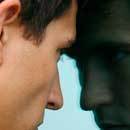4 Cliché Movie Moments Explained by Psychology

There are certain rules that extend across nearly every movie universe which we as an audience have to accept. Bad guys will always attack one at time, high school girls will always date a guy they fundamentally hate and pedestrians will never end up in wheel wells during car chases. While the rules may seem completely divorced from reality, some of the more staggering clichés actually have science on their side. Still, the fact that these seemingly illogical movie moments have real-world explanations is less a demonstration of genius on the part of the script writers and more a testament to their blind luck as they accidentally stumbled onto legitimate scientific concepts. So don't celebrate yet, Hollywood, there's still a ton of shit you're doing wrong, these are just four examples where you happened to get it right, despite yourselves.

The Slow Clap


Getting Moral in the Mirror



Damsels in Distress


The psychology behind it:Well that's not entirely true. Science loves and respects you. It did, however, conduct a study that found women respond differently to immediate peril than men. The study measured brain activity in both sexes when confronted with perceived danger and it sparked very different parts of the brain for each. Men's brains showed increased activity in the part of the brain responsible for instinctive functions like breathing and heart rate, essentially preparing the body to fight or run the hell away.

Walking into Dark Rooms


The psychology behind it:While it certainly pays as a species to avoid the terrible things of which we are afraid, we as humans are also capable of recognizing that some of our fears are completely stupid. We then have the ability to habituate to fear and therefore overcome it. Habituation is essentially just the desensitization to any stimuli, whether that be good or bad stimuli, and it's happening to you every day. You may notice that horror movies that used to scare you as a child aren't quite as terrifying anymore. Your constant exposure to the horror makes it difficult for the movie to surprise you with novel stimuli. Well the same thing happens with all the fears and phobias in your daily life as well. What's more, there's a tangible feeling of reward when you overcome a phobia by exposing yourself to it, and that activates the pleasure center in your brain. Avoiding fears, on the other hand, can fill you with a sense of failure and unhappiness. Psychologist Dr. Noam Shpancer from Psychology Today writes, "When you avoid something that scares you, you tend to experience a sense of failure. Every time you avoid a feared object or situation, your anxiety gains strength while you lose some. Every time you avoid the feared object or situation, you accumulate another experience of failure and another piece of evidence attesting to your weakness." As a result, the reward of habituation and the failure of avoiding phobias gradually make us addicted to finding and facing new fears. Presumably, it's comparable to standing on the edge of a cliff and feeling the urge to jump -- you know the consequences would be catastrophic, but there's something inside you that says, "Just try it, pussy."

Be sure to check out more from Soren in 4 Gritty Reboots of 80s Cartoons for Girls and 5 Products that Will Be Exposed as B.S. in 2011.